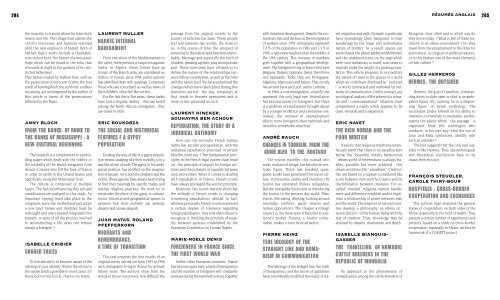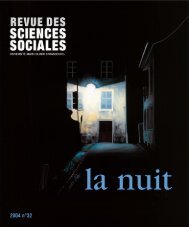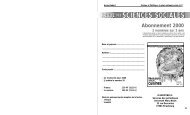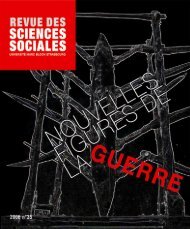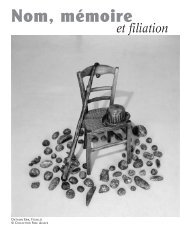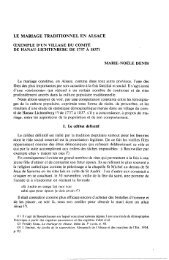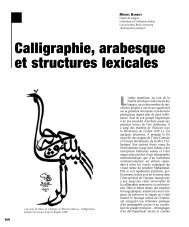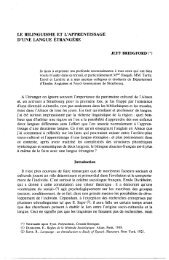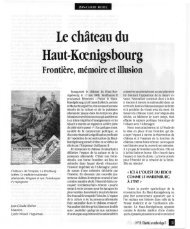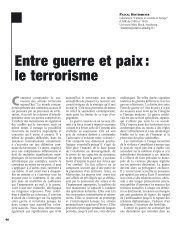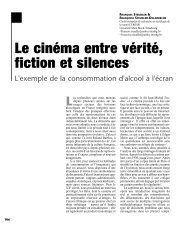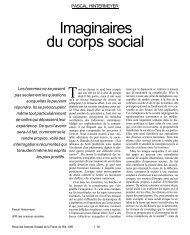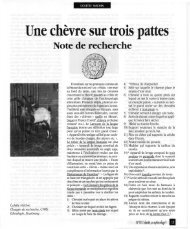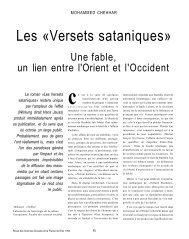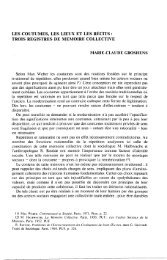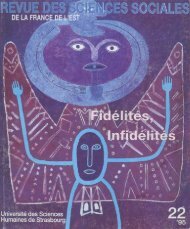Revue des sciences sociales
Revue des sciences sociales
Revue des sciences sociales
You also want an ePaper? Increase the reach of your titles
YUMPU automatically turns print PDFs into web optimized ePapers that Google loves.
204<br />
RÉSUMÉS ANGLAIS<br />
205<br />
the majority, to a point where he loses both<br />
reason and life. The village then admits the<br />
victim’s innocence, and harmony restored<br />
until the next explosion of hatred. Both of<br />
Nathan Katz’s works include a charitable,<br />
non-violent hero, the bearer of a messianic<br />
hope which can be heard in the echo that<br />
resounds at night in the gardens of his restricted<br />
fatherland.<br />
The themes evoked by Nathan Katz, such as<br />
the persecution of innocent victims, the foul<br />
smell of burning flesh, the survivors’ endless<br />
mourning, are reinterpreted by the author of<br />
this article in terms of the persecutions<br />
inflicted by the Nazis.<br />
ANNY BLOCH<br />
FROM THE BANKS OF RHINE TO<br />
THE BANKS OF MISSISSIPPI : A<br />
NEW CULTURAL BEGINNING<br />
The research is a complement to a preceding<br />
paper which dealt with the fidelity or<br />
the infidelity of the Jewish emigrants from<br />
Alsace-Lorraine who left the East of France<br />
in order to settle in the United States and<br />
specifically along the Mississippi river.<br />
The culture is composed of multiple<br />
layers. The factors influencing this cultural<br />
stratification are analyzed in this study. An<br />
important synergy must take place as the<br />
emigrants leave the motherland and adopt<br />
a new land. Values and lifestyles must be<br />
rethought and one’s passed integrated into<br />
present. In spite of all the process involved<br />
in reconstructing a life, does one remain<br />
always a foreigner ?<br />
ISABELLE CRIBIER<br />
SHARED EXILES<br />
To live abroad is to become aware of the<br />
altering of your identity. Whilst the return to<br />
the native land is possible in most cases, for<br />
those born in the D.D.R., there is no return.<br />
LAURENT MULLER<br />
HARKIS INTERNAL<br />
BANISHMENT<br />
From one shore of the Mediterranean to<br />
the other, there persists a suspicion against<br />
harkis. In Algeria, these former back-up<br />
troops of the French army are considered as<br />
traitors. In France, since 1954, public opinion<br />
has identified them with quislings. Conversely<br />
those who are concerned, as well as many of<br />
their children, often feel like victims.<br />
For the last thirty-five years, these harkis<br />
have had a singular <strong>des</strong>tiny : they are exiled<br />
among the North- African immigrants : they<br />
are exiles in exile.<br />
ERIC BOUKOBZA<br />
THE SOCIAL AND HISTORICAL<br />
FEATURES F A GYPSY<br />
POPULATION<br />
Evoking the way of life of a gypsy population<br />
means studying why their mobility is in a<br />
way like a form of exile. The gypsy, in his ambiguous<br />
position, has an effect on the imagination<br />
of people : he is both the predator and the<br />
victim. These gypsies have always been trying<br />
to find their bearings by specific tra<strong>des</strong> and<br />
intense religious practices. We must try to<br />
reconsider the place of the gypsy in cultural,<br />
social, historical and geographical spaces to<br />
perceive how their mobility can embody<br />
dreams and arouse anguish.<br />
JUAN MATAS, ROLAND<br />
PFEFFERKORN<br />
MIGRANTS AND<br />
REMEMBRANCE:<br />
A TIME OF TRANSITION<br />
This text presents the first results of an<br />
original survey carried out from 1993 to 1996<br />
with immigrants living in Alsace for at least<br />
fifteen years. The authors show from the<br />
words of those concerned, how difficult the<br />
passage from the original society to the<br />
society of welcome has been. These people<br />
feel torn between two worlds, the more so<br />
as, in the course of time, the prospect of<br />
returning to the native land becomes improbable.<br />
Marriage and especially the birth of<br />
children, growing up here, play an important<br />
part. These interviews have allowed us to<br />
define the nature of the relationships between<br />
fellow-countrymen, as well as the links<br />
with the native land. We have underlined the<br />
changes which have taken place during this<br />
transitory period : the stay, temporary at<br />
first, tends to become permanent and is<br />
more or less perceived as such.<br />
LAURENT HINCKER,<br />
SOUHAYMA BEN ACHOUR<br />
REPUDIATION, THE STUDY OF A<br />
JURIDICAL ANTINOMY<br />
How can one reconcile French human<br />
rights law, secular and egalitarian, with the<br />
unilateral repudiation practised in certain<br />
Muslim countries ? Two fundamental principles<br />
in the French legal system clash head<br />
on : the principle of respect for foreign cultures<br />
and the principle of equality between<br />
men and women. When it comes to dealing<br />
with repudiation in France, French courts<br />
have always privileged the second principle.<br />
Moreover, two recent matters show that<br />
the attitude of French courts is changing<br />
concerning repudiations abroad. In fact,<br />
whereas previously French courts expressed<br />
a certain degree of tolerance regarding<br />
foreign repudiation, they now often refuse to<br />
recognise it, invoking the principle of equality<br />
between spouses established by the<br />
European Convention on Human Rights.<br />
MARIE-NOELE DENIS<br />
FOREIGNERS IN FRANCE SINCE<br />
THE FIRST WORLD WAR<br />
Unlike other European countries, France<br />
has become quite early a land of immigration<br />
and the number of foreigners will constantly<br />
increase during the twentieth century, together<br />
with industrial development. Despite the economical<br />
crisis and the ban on the immigration<br />
of workers since 1974, immigrants represent<br />
7,4 % of the population in 1982 and 7,3 % in<br />
1990, a rate never reached since the middle of<br />
the 19th century. This increase in numbers<br />
goes together with a geographical development.<br />
The foreigners living in France first were<br />
Belgians, Italians, Germans, Swiss, then Poles<br />
and Spaniards. Today they are Portuguese,<br />
Algerians, Maroccans and Asians. They mostly<br />
live around Paris and Lyon, and in Lorraine.<br />
In 1984, a new immigration, a family one<br />
appeared, the only legal one. Assimilation<br />
has become easier for foreigners, but there<br />
is a problem of employment brought about<br />
by a younger workforce and a feminine one.<br />
Indeed, the increase of unemployment<br />
affects more foreigners than nationals and<br />
itensifies xenophobic reactions.<br />
ANDRÉ RAUCH<br />
CHANGES IN TOURISM: FROM THE<br />
GUIDE BLEU TO THE ROUTARD<br />
The tourist-traveller, this nomad who<br />
seeks no place of refuge, has become an everyday<br />
figure. These last hundred years,<br />
guide-books have generated this travel culture.<br />
In museums, castles and churches, the<br />
tourist has venerated lifeless reliquaries.<br />
But the new guide-books aim at introducing<br />
the tourist to the present day world. Plain<br />
events, like eating, drinking, looking around<br />
neutralize conflicts, pacify objects and<br />
reduce oppositions. The cheaper a foreign<br />
country is, the more open it becomes to everyone’s<br />
pocket. Poverty, a tourist consumable,<br />
makes it even more attractive.<br />
PIERRE HEINZ<br />
TEHE IDEOLOGY OF THE<br />
STRAIGHT LINE AND NOMA-<br />
DISM IN COMMUNICATION<br />
The ideology of the straight line, the myth<br />
of transparency and the boom of capitalism<br />
have considerably modified the reality of travel,<br />
migration and exile. Nomads in particular<br />
have increasingly been hampered in their<br />
wanderings by the linear and authoritative<br />
nature of borders. As a result, spaces can<br />
seem closed, the planet grided and delimited,<br />
and the undefined zones on the map which<br />
were once invitations to travel, now seem to<br />
implode under the weight of a growing population.<br />
This article proposes to reconstitute<br />
the nature of travel in the spaces of a world<br />
which we could have dismissed as ” enclosed<br />
”, a world contracted and narrowed by networks<br />
of communication. On the contrary, any<br />
sociological analysis of the advent of a nomadic<br />
and ” communicational ” tribalism must<br />
comprehend a reality which appears to be<br />
open, versatile and in expansion.<br />
ERIC NAVET<br />
THE RICH NOMAD AND THE<br />
POOR WRETCH<br />
It seems that religious traditions unanimously<br />
admit that there is no paradise here<br />
below. The ” beautiful, orderly, harmonious<br />
” dream world of Amerindians is always feasible,<br />
possible but never achieved ; this<br />
dream world must be ” elsewhere ”. Creation,<br />
life, are based on a rupture (considered like<br />
a sin) between man and the Creator and on<br />
discrimination between creatures. For socalled<br />
” revealed ” religions, rupture, banishment<br />
and difference establish and/or legitimize<br />
a relationship of power between man<br />
and the world. The religions of natural societies<br />
develop a philosophy, an ethnic of ”<br />
reconciliation ” of the human being with the<br />
rest of creation. Thus, knowledge may be<br />
attained by dreams, shamanism and death.<br />
ISABELLE BIANQUIS-<br />
GASSER<br />
THE TRAVELLING OF NOMADIC<br />
CATTLE BREEDERS IN THE<br />
REPUBLIC OF MONGOLIA<br />
An approach to the phenomenon of<br />
nomadization among the cattle-breeders of<br />
Mongolia. How often and in which way do<br />
they move today ? What is left of these traditions<br />
in an urban environment ? Do they<br />
travel from one encampment to the other for<br />
economical, ecological or political reasons,<br />
or is this feature one of the main elements<br />
of their culture ?<br />
GILLES HERREROS<br />
HERMES, THE OUTSIDER<br />
Hermes, the god of travellers, commanding<br />
doors to slide open or shut, is an ambivalent<br />
figure. Sly, cunning, he is a disquieting<br />
figure of Greek mythology. The<br />
sociologist pri<strong>des</strong> himself on his ability to<br />
intervene, to translate, to mediatize, and frequents<br />
the places where “ the passage ” is<br />
organized. Must this sociologist, who<br />
conducts, in his own way, what the son of<br />
Zeus and Maïa symbolizes, identify with<br />
such an outsider ?<br />
The text suggests that the only real outsider<br />
is like Hermes. Thus, epistemological<br />
and theoretical conclusions have to be<br />
drawn from this fact.<br />
FRANÇOIS STEUDLER,<br />
CAROLE THIRY-BOUR<br />
HOSPITALS : CROSS-BORDER<br />
COOPERATION AND EXCHANGES<br />
The authors have analyzed the general<br />
stakes of cooperation, on both si<strong>des</strong> of the<br />
Rhine, especially in the field of health. They<br />
present a certain number of experiences and<br />
projects, based on a study on cross-border<br />
cooperation, especially in Alsace, within the<br />
framework of a COMETT project.


